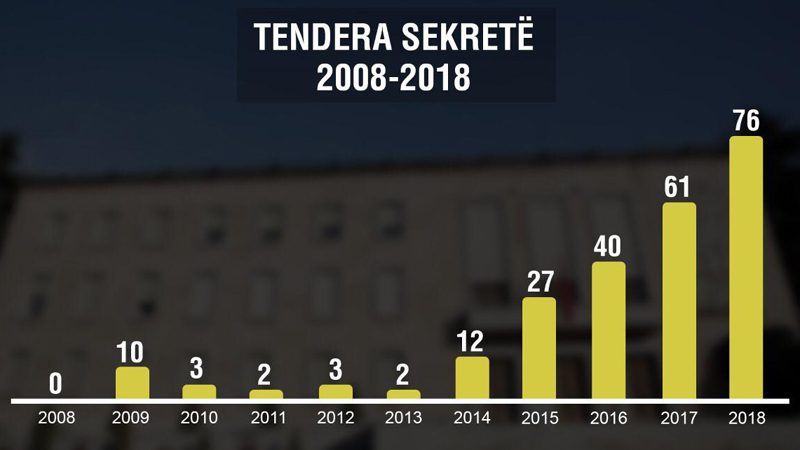The Albanian Supreme State Audit Institution report for 2018 shows that the total amount of government misuse of public funds reaches a record high level of 1.7 billion euros. Out of this sum, 923 million euros is the economic damage from uncollected government revenues and 587 million euros are due to misexpenditures relating to public tenders.
The record level of public concessions and PPPs developed by the Rama government appear to be of significant importance. Beyond their impact for the public future debt exposure, the procedure and the amounts involved in these concessionary and PPP contracts, raise important doubts as of their transparency and tue economic rationale.
Up to now, a limited number 19 companies owned by 11 government-backed oligarchs, have won 2.100 bids equalling to 263 million euros. Over 630 public tenders have been awarded through a direct negotiation procedure without announcement.
Four majority MPs have won 410 public tenders and concessions valued at 82 mln euros. Out of the total concessions given to these majority MPs, 97 public tenders worth 5 mln euros, were given through direct negotiation without announcement.
According to data from the Public Procurement Agency, the 11 government-backed oligarchs denounced by DP have benefited 242 public tenders during 2018, equaling 3.6% of the total number of procurements for a total of 52 mln euros or 7% of the total value of procurements in 2018. 34% of these tenders were made in the conditions of one sole competitor for the contract, which clearly says there was no competition at all. Out the remaining tenders, 65 were directly negotiated procedures without announcement worth 6,3 mln euros, representing 15% of the total negotiated contracts value of 2018.
In the meantime, according to comparative data, Albanians pay more taxes than all neighbouring countries, while receiving a lower income and facing higher living costs. The fiscal policies of the government since January 2014 have been pro-monopolies and against free market competition; the law of strategic investments or the new draft law on the Albanian Investment Corporation, do not help entrepreneurship or FDIs, but non-transparent corruptive and anti-constitutional large financial & infrastructural projects.
The decrease of bank savings has become more apparent, considering that nearly 4% of Albanians account for over 57% of the total bank savings. In parallel, salaries have remained stagnant in these recent years albeit all statistical data confirm, in contrast, that product prices have increased. According to the Central Bank of Albania, 26% of households have debts and 30% have received informal loans to support their daily needs.
The UNDP Albania report is a significant indicator of the negative impact of the progressive tax. The report states that the progressive tax has adversely affected the reduction of poverty and the growth of the middle class. According to the report, ” If there had not been a change from flat tax to progressive taxation, estimated consumption compared to current consumption shows that poverty would have fallen and middle class would have expanded by more than 2.5% “. Put shortly and clearly, the progressive tax has not helped the poor and the middle class, it has rather deepened poverty, increased it, and has contributed to reducing social mobility.
Data from the statistics report show that Albania does not have policies relating to salary increases in both the private and public sector. According to the state budget, wages in the public sector have had the lowest growth since 1993. Which translates in terms of growth, that in 5 years of socialist government, the wages increase is equal to the rise after 50 years of dictatorship.
This is why Albanians spend today most of their income to be food and daily consumption items, especially with the purchase of bread, according to EUROSTAT / Monitor data.
The tax increase has also affected state budget.
For the fiscal year 2018, the total revenues budget was lower than the forecast and lower than the previous year. Starting January 2014 up to now, the government has increased the fiscal burden by 1.9 billion euros. The collection of taxes in relation to GDP has increased by 3.5%. Shortly, the collection of taxes in the budget has increased at the same level as the taxes in total.
But we are facing neither an increase of the formalized economy, nor an increase of revenues as a result of fiscal policies, or an increase of employment and economic growth. On the contrary, according to data and studied of the Central Bank of Albania, consumption has fallen in relation to previous years, which is confirmed even by the revenues in the budget.
As comparison, Serbia, which has the same tax burden, collects a record regional level revenues, expected at 41.8% of GDP for 2019.While Montenegro is at the level of 40.1% of GDP in their 2019 draft budget.
Public Debt of Albania compared to the region:
Public Debt 2013 Public Debt 2018
– Albania: 65.5 % of GDP – Albania: 83.1 % of GDP
– Montenegro: 57.5 % of GDP – Montenegro: 69.3 % of GDP
– Serbia: 52.6 % of GDP – Serbia: 55.9 % of GDP
– Bosnia: 34.5 % of GDP – Macedonia: 44.0 % of GDP
– Macedonia: 34 % of GDP – Bosnia: 36.3 % of GDP
– Kosovo: 8.9 % of GDP – Kosovo: 16 % of GDP
(in descending order)
Business crediting has fallen by 180 mln euro – confidence in the economy has fallen at worrisome levels as Albanian economy has stooped circulating its capital in an effective manner, in order to provide a healthy economic activity. 78 800 small businesses have stopped their activity since January 2014 until today. Over 60 businesses close every day starting January 2014.
The introduction of VAT for small businesses has not contributed neither to the increase of the VAT revenues to the budget, nor to the increase of enterprises income. State budget data for 2018 report that VAT collection is at 8.7% of GDP. The total value of taxes paid by businesses is currently at over 37% of profit and revenue. The 50% increase of taxes has led to an increase of production costs, while the falling the euro/lek exchange has led to an 11% decrease of profits.
The American Chamber of Commerce, the German Chamber of Commerce and the Albanian one, have officially complained about this situation, including relating to high taxes, non-pro-business fiscal policies that produce inequality and the non-transparency of PPPs. Similarly, businesses declare that they suffer from the non-reimbursement of VAT though the government has increased public debt after the financial deal made with the IMF in September 2013. Liabilities to businesses reflect indeed still very high level. In January 2019, the IMF accounted these liabilities up to 300 million euros.
Such situation is also confirmed by an U.S. State Department report underlines that Albania’s climate is not pro-business. The fiscal policies of the government since January 2014 have been pro-monopolies and against free market competition; the law of strategic investments or the new draft law on the Albanian Investment Corporation, do not help entrepreneurship or FDIs, but monopolies and untransparent large infrastructural projects.
INSTAT data for 2017 shows indeed that sales of businesses with 1 to 4 employees have fallen by 40 billion lek, or 16%. This situation is reflected also on the sales of businesses with 5 to 9 employees. For this category, the contraction is estimated at 10%, or 19 billion ALL against the previous year.



